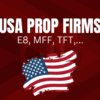When exploring opportunities with proprietary trading firms, one significant factor that varies across the board is the consistency rule requirement. This criterion is crucial for traders to understand as it can significantly impact their trading strategy and eligibility for funding. In this article, we delve into which proprietary trading firms enforce a consistency rule, aiding traders in making informed decisions when choosing a firm to partner with.
Overview of Proprietary Trading Firms with Consistency Rule Requirements
The consistency rule in proprietary trading is designed to assess a trader’s ability to generate profits consistently, without taking undue risks. Not all firms have this requirement, but for those that do, it’s a pivotal part of their evaluation process. Below, we outline which firms mandate this rule and which do not, providing a clear guide for prospective traders.
- Finotive Funding – Requires consistency for Pro Challenge, Standard, and Aggressive Instant Funding accounts.
- FTUK – Implements a consistency rule in their evaluation process.
- FundedNext – Demands consistency for Express Consistency accounts.
- Lux Trading Firm – Has a consistency requirement for traders.
- Super Funded – Enforces a consistency rule in their funding criteria.
It’s important for traders to note that the majority of proprietary trading firms, including well-known names like E8 Funding, Alpha Capital Group, and FTMO, do not have a consistency rule. This means that while traders are expected to manage risk and perform well, they are not explicitly required to demonstrate consistency over the evaluation period in the same way as firms with the rule in place.
Choosing the Right Proprietary Trading Firm
For traders prioritizing firms without a consistency requirement, the options are vast, offering flexibility in trading strategies. However, for those who excel in consistent trading and wish to leverage this skill for better opportunities, firms with a consistency rule might offer a more suitable challenge and potentially greater rewards.
In conclusion, understanding the nuances of a proprietary trading firm’s requirements, such as the consistency rule, is vital for traders aiming to find the best fit for their trading style and goals. This knowledge enables traders to align with firms that value their specific strengths, thereby enhancing their chances of success in the competitive world of proprietary trading.
























